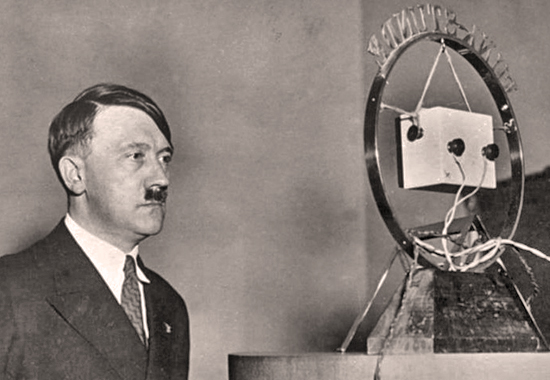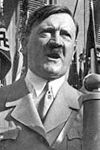|

ADOLF HITLER BROADCASTING
Appeal to the Nation
Go here for more about
 Adolf Hitler.
Adolf Hitler.
Go here for more about
 Adolf Hitler's Appeal to the Nation.
Adolf Hitler's Appeal to the Nation.
Go here for the
 original German version of Hitler's
Appeal to the Nation.
original German version of Hitler's
Appeal to the Nation.
It follows the full text transcript of
Adolf Hitler's Appeal to the Nation, translated from German
to English,
recorded on July 15, 1932.

 |
Fate has allotted
those in power today more than thirteen years to
be tested and proven. |
But they hand down
their own worst sentence, in that they
themselves confess to the failure of their
efforts by the type of propaganda they use
today. Once it was their desire to govern
Germany better in the future than in the past,
and they are forced to observe that the only
real product of their attempts at government is
that Germany and the German Volk are still
alive.
In the November
days of ‘18 [1918], they solemnly pledged to
lead our Volk and in
particular the German worker into a better
economic future. Today, after they have had
nearly fourteen years to keep their promise,
they cannot cite a single German professional
group as witness for the quality of their
actions.
The German peasant
has become impoverished; the mittelstand
is ruined; the social hopes of many millions of
people are destroyed; one third of all German
men and women of working age is unemployed and
thus without income; the Reich, the communities,
and the Länder are over indebted;
finances are in a muddle across the board; and
all the coffers are empty!
What more could
they possibly have destroyed? The worst thing,
though, is the destruction of the faith in our
Volk, the elimination of all hopes and all
confidence. In thirteen years they have not
succeeded in mobilizing in any way the powers
slumbering in our Volk; on the contrary!
Out of their fear
of the awakening of the nation, they have played
people off against one another: the city against
the country, the salaried workers against
the civil servants, those who work with their
hands against those who work with their brains,
the Bavarians against the Prussians, the
Catholics against the Protestants, and so forth,
and vice versa.
The activism of
our race was entirely consumed at home;
outwardly, only fantasies remained: fantastic
hopes of a cultural conscience, a law of
nations, a
world conscience, ambassador conferences, the
League of Nations, the second Internationale,
the third Internationale, proletarian
solidarity, etc.—and the world treated us
accordingly.
Thus Germany has
slowly disintegrated, and only a madman can
still hope that those forces which first caused
this disintegration might now bring about the
resurrection. If the present parties seriously
want to save Germany, why have they not done so
already? Had they wanted to save Germany, why
has it not happened? Had the men of these
parties honestly intended to do so, then their
programs must have been bad. If, however, their
programs were right, then either their desire
cannot have been sincere, or they must have been
too ignorant or too weak.
Now, after
thirteen years, after they have destroyed
everything in Germany, the time has finally
arrived for their own elimination. Whether or
not today’s parliamentary parties exist or not
is of no consequence; what is, however,
necessary is that the German nation be prevented
from falling completely into ruin.
Therefore it is a
duty to vanquish these parties, for in order to
secure their own existence, they must tear the
nation apart over and over again. For years they
have persuaded the German worker into believing
that he alone could save himself. Fooled the
peasant for years by claiming that only his
organization would help him.
The mittelstand
was to be snatched from the jaws of ruin by
parties of the mittelstand; the economy
by the parties of business. The Catholic was
forced to
seek his refuge with the Center, the Protestant
with the Christian Socialist People’s Service.
In the end even the house owners had their own
political representation, just as did the
tenants, the salaried workers, and the civil
servants.
However, these
attempts at breaking the nation down into
classes, ranks, professions, and confessions and
at leading it piece by piece to the economic
good fortune of the future have now failed
completely.
Even on the day
our National Socialist Movement was founded, we
were already governed by the conviction that the
fate of the German individual is inseparably
bound up with the fate of the entire nation.
When Germany disintegrates, the worker will not
flourish in social good fortune and neither will
the entrepreneur; the peasant will not save
himself then; nor will the mittelstand.
No, the ruin of
the Reich, the disintegration of the nation,
means the ruin and the disintegration of all!
Not a single confession and not a single German
tribe will be able to escape sharing the same
lot. Even on the day our National Socialist
Movement was founded, we had already long been
certain that it was not the proletariat which
would be victor over the bourgeoisie, and not
the bourgeoisie which would be victor over the
proletariat, but that international big finance
must ultimately become the sole victor over
both. And that is what has come to pass!
Recognizing this
disintegration, thirteen years ago I took a
handful of people and formed a new movement
which in its very name is to be a proclamation
of the new Volksgemeinschaft. There is no such
thing as socialism which does not have the power
of the spirit at its disposal; no such thing as
social good fortune which is not protected
by—and even finds its prerequisite in—the power
of a nation.
And there is no
such thing as a nation—and thus no such thing as
nationalism—if the army of millions who work
with their intellects are not joined by the army
of millions who work with their fists, the army
of millions of peasants. As long as Nationalism
and Socialism march as separate ideas, they will
be defeated by the united forces of their
opponents. On that day when both ideas are
molten into one, they will become invincible!
And who will deny
that, in a time when everything in Germany is
falling apart and degenerating, when everything
in the business world and political life is
reaching a standstill or coming to an end, a
single organization has experienced an enormous
and miraculous upturn?
With seven men I
began this task of German unification thirteen
years ago, and today over thirteen million are
standing in our ranks. However, it is not the
number that counts, but its inner value!
Thirteen million
people of all professions and ranks—thirteen
million workers, peasants, and intellectuals;
thirteen million Catholics and Protestants;
members of all German Länder and
tribes—have formed an inseparable alliance. And
thirteen million have recognized that the future
of all lies only in the joint struggle and the
joint successes of all. Millions of peasants
have now realized that the important thing is
not that they comprehend the necessity of their
own existence; rather, it is necessary to
enlighten the other professions and walks of
life as to the German peasant, and to win them
for his cause.
And millions of
workers have similarly realized today that, in
spite of all the theories, their future lies not
in some “Internationale” but in the realization
on the part of their other Volksgenossen that,
without German peasants and German workers,
there simply is no German power. And millions of
bourgeois intellectuals, too, have come to the
realization of how insignificant their own
illusions are if the masses of millions
comprising the rest of the Volk do not finally
comprehend the importance of the German
intellectual class.
Thirteen years ago
we National Socialists were mocked and
derided—today our opponents’ laughter has turned
to tears! A faithful community of people has
arisen which will gradually overcome the
prejudices of class madness and the arrogance of
rank. A faithful community of people which is
resolved to take up the fight for the
preservation of our race, not because it is made
up of Bavarians or Prussians or men from
Württemberg or Saxony; not because they are
Catholics or Protestants, workers or civil
servants, bourgeois or salaried workers, etc.,
but because all of them are Germans.
Within this
feeling of inseparable solidarity, mutual
respect has grown, and from this respect has
come an understanding, and from this
understanding the tremendous power which moves
us all. We National
Socialists thus march into every election with
the single commitment that we will, the
following day, once more take up our work for
the inner reorganization of our body politic.
For we are not fighting merely for the mandates
or the ministerial posts, but rather for the
German individual, whom we wish to and shall
join together once more to inseparably share a
single common destiny.
The Almighty, Who
has allowed us in the past to rise from seven
men to thirteen million in thirteen years, will
further allow these thirteen million to once
become a German Volk. It is in this Volk that we
believe, for this Volk we fight; and if
necessary, it is to this Volk that we are
willing, as the thousands of comrades before us,
to commit ourselves body and soul.
If the nation does
its duty, then the day will come which restores
to us: one
Reich in honor and freedom—work and bread!

More History
|